

Twitter. HADC. For IBM, Africa Is Risky and Rife With Opportunity. Tony Mwai moved back to his homeland of Kenya in 2009 to run IBM’s (IBM) East Africa operations, about 20 years after joining the company in New York.

The country was still recovering from a political crisis that erupted following the disputed election of President Mwai Kibaki, leaving thousands dead or homeless. The IBM executive encountered a Kenya unrecognizable from his childhood, a growing economy with great potential but also constrained by every infrastructure challenge imaginable. Some Kenyan government departments still used paper to store data, and traffic jams were epic. For IBM and its new chief executive officer, Virginia “Ginni” Rometty, the problems of Kenya and elsewhere in Africa add up to a tantalizing opportunity. So just as former CEO Samuel Palmisano championed India and Louis Gerstner took on China before him, Rometty views the continent as a can’t-miss growth opportunity.
Frustrated Innovation. Africa is trending, if stories in the international media over the last year are anything to go by.
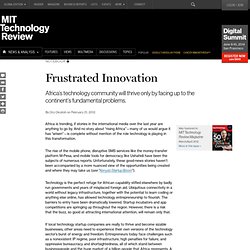
And no story about “rising Africa”—many of us would argue it has “arisen”—is complete without mention of the role technology is playing in this transformation. The rise of the mobile phone, disruptive SMS services like the money-transfer platform M-Pesa, and mobile tools for democracy like Ushahidi have been the subjects of numerous reports.
Soccer. Accesstomeds. Africanunion. Are foreign companies guilty of war crimes for pillaging the Congo? A report was released last week by the Open Society Justice Initiative, penned by University of British Columbia professor James Stewart, on "Corporate War Crimes," a primer on how pillage can be tried as a war crime.
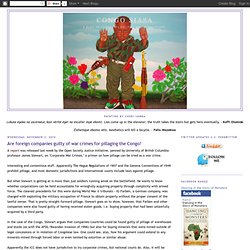
Interesting and contentious stuff. Apparently The Hague Regulations of 1907 and the Geneva Conventions of 1949 prohibit pillage, and most domestic jurisdictions and international courts include laws against pillage. But what Stewart is getting at is more than just soldiers running amok on the battlefield. He wants to know whether corporations can be held accountable for wrongfully acquiring property through complicity with armed force. The clearest precedents for this were during World War II tribunals - IG Farben, a German company, was charged with exploiting the military occupation of France to obtain property without the proper consent of the lawful owner.
Apparently the ICC does not have jurisdiction to try corporate crimes, but national courts do. Bushpunk and the Future of Africa. Kill me quick: Tackling alcoholism in Africa as a public health problem. The following two tabs change content below.
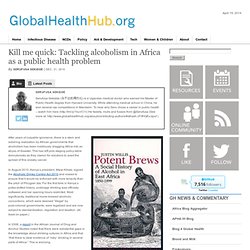
Serufusa Sekidde (乌干达的周杰伦) is a Ugandan medical doctor who earned his Master of Public Health degree from Harvard University. While attending medical school in China, he won several rap competitions in Mandarin. Time to recognize Africa’s rising middle class. Middle Classes in Africa is a project created and run by the photographer Joan BARDELETTI, in collaboration with various partners.
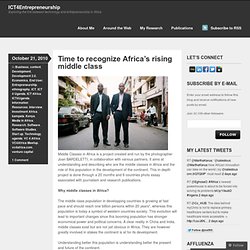
It aims at understanding and describing who are the middle classes in Africa and the role of this population in the development of the continent. This in-depth project is done through a 20 months and 6 countries photo essay associated with journalism and research publications. Why middle classes in Africa? The middle class population in developping countries is growing at fast pace and should reach one billion persons within 20 years*, whereas this population is today a symbol of western countries society. This evolution will lead to important changes since this booming population has stronger economical power and political concerns. Understanding better this population is understanding better the present and future of the continent.
What are the project goals? Reviews. Country Codes of Africa. Emerging Africa: in Depth. African Innovation: New Hope for Local Health Issues. The United States of Africa Philosophy - A Historical Perspective by Samuel Adjei. AFRICA: Mobile phones for health. What might mobile phones do for healthcare?
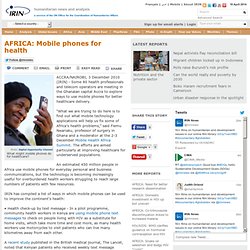
ACCRA/NAIROBI, 3 December 2010 (IRIN) - Some 80 health professionals and telecom operators are meeting in the Ghanaian capital Accra to explore ways to use mobile phones for better healthcare delivery. Finding Africa’s Innovators. [These are my notes from my talk at TEDxAntananarivo in Madagascar today] There are 2 things I’m going to leave you with today.

African Solutionz. Tuesday Map: Africa is really, really big. Tuesday Map: Africa is really, really big Share + Twitter Facebook Google + Reddit 26 Shares Full size version here.

The Rise Of M-Health. It really is wonderful what technology provides brought the world. Consider mobile phones for instance: basically 30 years ago who could have imagined that you would immediately be able to have in touch with people whether they were at the park, at the store or half way around the world. In addition to being able to get in feel with somebody no matter where they are, the mobile phone has also built the decimation of information a lot easier then it's ever been in the record of humankind. With cellular phone, text and internet accessible on almost single cell phone, getting essential information throughout a provider can certainly be achieved in less than a second.
Online magazine: Nobody's fault. By Ron Singer [ places - july 10 ] There exists a media stereotype of Africa as the continent of innocent populaces and terrible rulers.
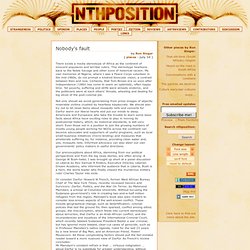
This stereotype hearkens back to the Noble Savage and other icons of historical racism. My own memories of Nigeria, where I was a Peace Corps volunteer in the mid-1960s, do not prompt a kindred binocular vision, a contrast between then and now. Certainly, that Tom-Brown era so soon after Independence (1960) has come to seem an optimistic, often happy time. Not only should we avoid generalizing from press images of abjectly miserable victims crushed by heartless kleptocrats. Our preconceptions about Africa, stemming from our political perspectives and from the big news stories, are often wrong. Or consider Darfur. Perspectives on African Studies and Development in Sub-Saharan Africa. Perspectives on African Studies and Development in Sub-Saharan Africa Leo J. de Haan Abstract.
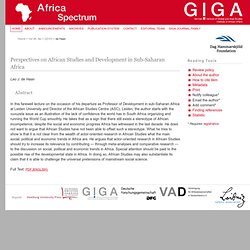
Interactive graphics - Emerging Africa: Developing aid on the continent.